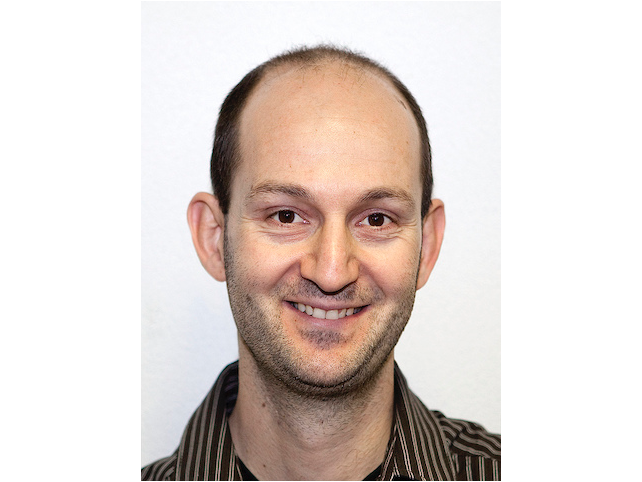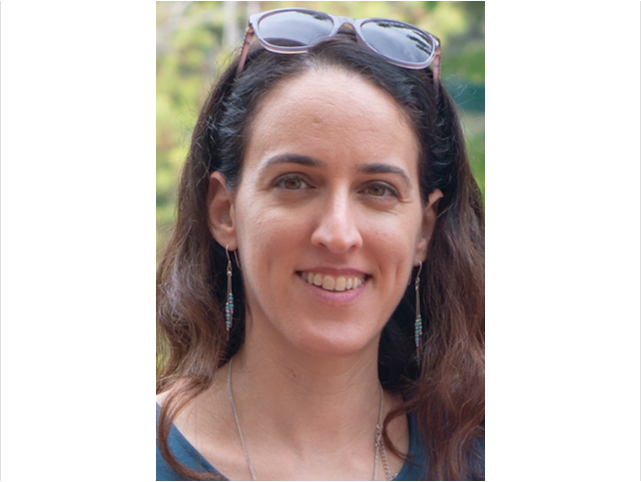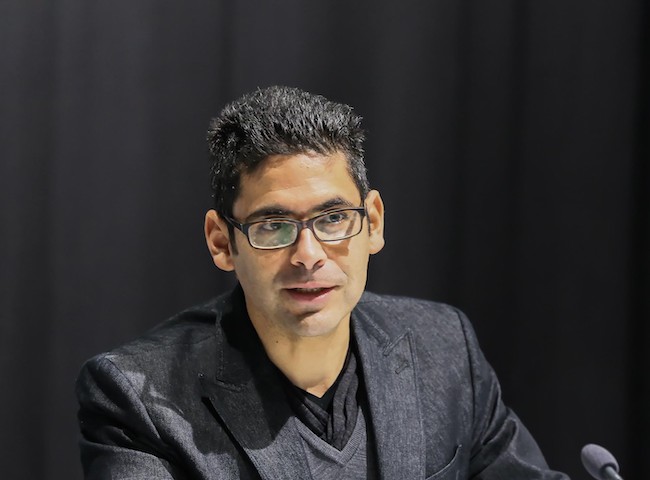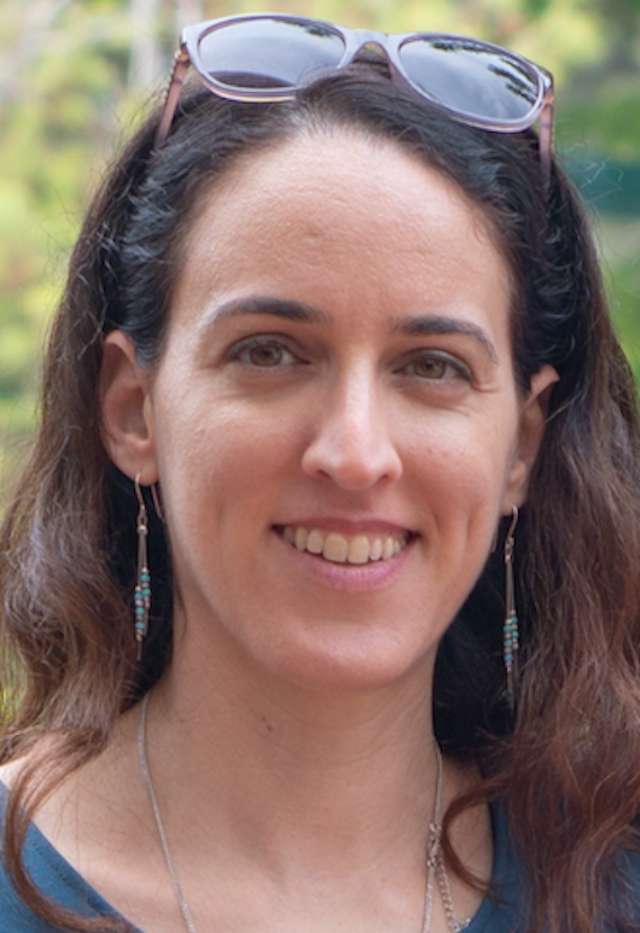About OPODIS 2019
is an open forum for the exchange of state-of-the-art knowledge concerning distributed computing and distributed computer systems. All aspects of distributed systems are within the scope of OPODIS, including theory, specification, design, performance, and system building. With strong roots in the theory of distributed systems, OPODIS now covers the whole range between the theoretical aspects and practical implementations of distributed systems, as well as experimentation and quantitative assessments.
Where
Université de Neuchâtel
Rue Emile-Argand 11
2000 Neuchâtel
Switzerland
When
Tuesday to Thursday
17-19 December
Keynote Speakers
We will host the following outstanding speakers.

Haris Pozidis, IBM Research
17.12.2019

Keren Censor-Hillel, Technion
18.12.2019

Rachid Guerraoui, EPFL
19.12.2019
Call for Papers
OPODIS is an open forum for the exchange of state-of-the-art knowledge concerning distributed computing and distributed computer systems. OPODIS aims at having a balanced program that combines theory and practice of distributed systems. OPODIS solicits papers in all aspects of distributed systems, including theory, specification, design, system building, and performance.
Topics of interest include, but are not limited to:
- Biological distributed algorithms
- Blockchain technology and theory
- Communication networks (protocols, architectures, services, applications)
- Cloud computing and data centers
- Dependable distributed algorithms and systems
- Design and analysis of concurrent and distributed data structures
- Design and analysis of distributed algorithms
- Randomization in distributed computing
- Social systems, peer-to-peer and overlay networks
- Distributed event processing
- Distributed operating systems, middleware, and distributed database systems
- Distributed storage and file systems, large-scale systems, and big data analytics
- Edge computing
- Embedded and energy-efficient distributed systems
- Game-theory and economical aspects of distributed computing
- Security and privacy, cryptographic protocols
- Synchronization, concurrent algorithms, shared and transactional memory
- Impossibility results for distributed computing
- High-performance, cluster, cloud and grid computing
- Internet of things and cyber-physical systems
- Mesh and ad-hoc networks (wireless, mobile, sensor), location and context-aware systems
- Mobile agents, robots, and rendezvous
- Programming languages, formal methods, specification and verification applied to distributed systems
- Self-stabilization, self-organization, autonomy
- Distributed deployments of Machine Learning
Double-blind review
We will use double-blind peer review in OPODIS 2019. All submissions must be anonymous. We will use a somewhat relaxed implementation of double-blind peer review in OPODIS 2019: you are free to disseminate your work through arXiv and other online repositories and give presentations on your work as usual. However, please make sure you do not mention your own name or affiliation in the submission, and please do not include obvious references that reveal your identity. A reviewer who has not previously seen the paper should be able to read it without accidentally learning the identity of the authors. Please feel free to ask the PC chairs if you have any questions about the double-blind policy of OPODIS 2019.
Submissions
Papers are to be submitted electronically through EasyChair at the following Submission link (https://easychair.org/conferences/?conf=opodis19). Submissions must be in English in pdf format and they must be prepared using the LaTeX style templates for LIPIcs and choosing the A4 paper option. A submission must not exceed 16 pages, including the cover page, figures, tables and references. The cover page should include the title of the paper, a list of keywords, and an abstract of 1 to 2 paragraphs summarizing the contributions of the submission. The submission must contain a clear presentation of the merits of the paper, including discussion of its importance, prior work, and an outline of key technical ideas and methods used to achieve the main claims. All of the ideas necessary for an expert to fully verify the central claims in the submission, including experimental results, should be included either in the submission or in a clearly marked appendix. The appendix will be read at the discretion of the reviewers. If desired, the appendix can be a copy of the full paper. A submission must report on original research that has not previously appeared in a journal or conference with published proceedings. It should not be concurrently submitted to such a journal or conference. Any overlap with a published or concurrently submitted paper must be clearly indicated. The Program Chairs reserve the right to reject submissions that are out of scope, of clearly inferior quality, or that violate the submission guidelines. Each of the remaining papers will undergo a thorough reviewing process.
Publication
OPODIS has post-proceedings published by Leibniz International Proceedings in Informatics (LIPIcs) in gold open access mode. The proceedings become available online, free of charge, after the conference. Preliminary versions of the proceedings will be available to participants at the conference electronically. The camera-ready version of a paper must have the same format and be of the same length as its submitted version.
Awards
Awards will be given to the best paper and the best student paper (i.e., primarily written by a student). Eligibility for the best student paper award should be clearly indicated on the cover page.
Important Dates
- Abstract registration:
Saturday, August 31, 2019Tuesday, September 3, 2019 (extended, final) - Submission deadline:
Thursday, September 5Monday, September 9, 2019 (extended, final) - Acceptance notification: Friday, October 25, 2019
- Final version due: November 14, 2019
- Conference: December 17-19, 2019
Committees
Organising Committee
- General Chair:
- Pascal Felber (University of Neuchâtel, Switzerland)
- Organising Chair:
- Valerio Schiavoni (University of Neuchâtel, Switzerland)
- Finance Chair:
- Peter Kropf (University of Neuchâtel, Switzerland)
- Proceedings Chair:
- Avery Miller (University of Manitoba, Canada)
- Steering Committee:
- James Aspnes (Yale, USA)
- Xavier Défago (Tokyo Institute of Technology, Japan)
- Faith Ellen (University of Toronto, Canada)
- Pascal Felber (University of Neuchâtel, Switzerland)
- Alessia Milani (University of Bordeaux, France)
- Luis Rodrigues (University of Lisboa, Portugal)
- Sébastien Tixeuil (Sorbonne University, France) — chair
- Yukiko Yamauchi (University Kyushu, Japan)
Program Committee
- Program Committee Co-Chairs:
- Roy Friedman (Technion, Israel)
- Seth Gilbert (NUS, Singapore)
- Program Committee:
- James Aspnes (Yale, USA)
- John Augustine (Indian Institute Of Technology Madras, India)
- Michael A. Bender (Stony Brook University, USA)
- Natacha Crooks (The University of Texas at Austin, USA)
- Gianlorenzo D'Angelo (Gran Sasso Science Institute, Italy)
- Elias Duarte (Federal University of Parana, Brazil)
- Xavier Défago (Tokyo Institute of Technology, Japan)
- Gil Einziger (Technion, Israel)
- Paola Flocchini (University of Ottawa, Canada)
- Pierre Fraigniaud (CNRS and University Paris Diderot, France)
- Cyril Gavoille (LaBRI, University of Bordeaux, France)
- Valerie Issarny (INRIA, France)
- Alex Kogan (Oracle Labs, USA)
- Fabian Kuhn (University of Freiburg, Germany)
- Alberto Montresor (University of Trento, Italy)
- Adam Morrison (Tel Aviv University, Israel)
- Calvin Newport (Georgetown University, USA)
- Gopal Pandurangan (University of Houston, USA)
- Marta Patino (Universidad Politécnica de Madrid, Spain)
- Sebastiano Peluso (Amazon Web Services, USA)
- Jose Pereira (University of Minho, Portugal)
- Peter Robinson (McMasters University, Canada)
- Luis Rodrigues (Universidade de Lisboa, Portugal)
- Christian Scheideler (University of Paderborn, Germany)
- Roman Vitenberg (University of Oslo, Norway)
- Chaodong Zheng (Nanjing University, China)
- Kfir Lev-Ari, Alexander Spiegelman, Idit Keidar and Dahlia Malkhi. FairLedger: A Fair Blockchain Protocol for Financial Institutions
- Weihai Yu, Victorien Elvinger and Claudia-Lavinia Ignat. A Generic Undo Support for State-Based CRDTs
- Sumi Acharjee, Konstantinos Georgiou, Somnath Kundu and Akshaya Srinivasan. Lower Bounds for Shoreline Searching with 2 or More Robots
- Álvaro García-Pérez and Maria A. Schett. Deconstructing Stellar Consensus
- Xiong Zheng, Vijay Garg and John Kaippallimalil. Linearizable Replicated State Machines with Lattice Agreement
- Xiong Zheng and Vijay Garg. Parallel and Distributed Algorithms for the Housing Allocation Problem
- Sayaka Kamei, Anissa Lamani, Fukuhito Ooshita, Sebastien Tixeuil and Koichi Wada. Gathering on Rings for Myopic Asynchronous Robots with Lights
- Ran Gelles and Siddharth Iyer. Interactive coding resilient to an unknown number of erasures
- Christian Cachin and Björn Tackmann. Asymmetric Distributed Trust
- Petr Kuznetsov, Thibault Rieutord and Sara Tucci-Piergiovanni. Reconfigurable Lattice Agreement and Applications
- Hiroto Yasumi, Fukuhito Ooshita and Michiko Inoue. Uniform Partition in Population Protocol Model under Weak Fairness
- Itay Harel, Amit Jacob-Fanani, Moshe Sulamy and Yehuda Afek. Consensus in Equilibrium: Can One Against All Decide Fairly?
- Kishori Konwar, N Prakash, Medard Muriel and Nancy Lynch. Fast Lean Erasure-coded Atomic Memory Object
- Paola Flocchini, Nicola Santoro and Koichi Wada. On Memory, Communication, and Synchronous Schedulers when Moving and Computing
- Kyrill Winkler, Ulrich Schmid and Yoram Moses. A Characterization of Consensus Solvability for Closed Message Adversaries
- Alex Auvolat, Michel Raynal and François Taïani. Byzantine-Tolerant Set-Constrained Delivery Broadcast
- Laura Schmid, Krishnendu Chatterjee and Stefan Schmid. The Evolutionary Price of Anarchy: Locally Bounded Agents in a Dynamic Virus Game
- Vassos Hadzilacos, Xing Hu and Sam Toueg. Optimal Register Construction in M&M Systems
- Muhammad Khan, Lewis Tseng and Nitin Vaidya. Exact Byzantine Consensus on Arbitrary Directed Graphs under Local Broadcast Model
- Diego Cepeda, Sakib Chowdhury, Nan Li, Raphael Lopez, Xinzhe Wang and Wojciech Golab. Toward Linearizability Testing for Multi-Word Persistent Synchronization Primitives
- Nikita Koval, Dan Alistarh and Alexander Fedorov. In Search of the Fastest Concurrent Union-Find Algorithm
- Yuval Emek, Noga Harlev and Taisuke Izumi. Towards Distributed Two-Stage Stochastic Optimization
- Tsuyoshi Gotoh, Paola Flocchini, Toshimitsu Masuzawa and Nicola Santoro. Tight Bounds on Distributed Exploration of Temporal Graphs
- Danupon Nanongkai and Michele Scquizzato. Equivalence Classes and Conditional Hardness in Massively Parallel Computations
- Michael Dinitz and Yasamin Nazari. Massively Parallel Approximate Distance Sketches
- Yasamin Nazari. Sparse Hopsets in Congested Clique
- Panagiota Fatourou, Nikolaos D. Kallimanis and Eleni Kanellou. An Efficient Universal Construction for Large Objects
- Shantanu Das, Giuseppe Antonio Di Luna, Paola Flocchini, Nicola Santoro, Giovanni Viglietta and Masafumi Yamashita. Oblivious Permutations on the Plane
- Genc Tato, Marin Bertier, Etienne Rivière and Cédric Tedeschi. Split and migrate: Resource-driven placement and discovery of microservices at the edge
- Felipe de Azevedo Piovezan, Vassos Hadzilacos and Sam Toueg. On deterministic linearizable set agreement objects
- Zhanhao Chen, Ahmed Hassan, Masoomeh Javidi Kishi, Jacob Nelson and Roberto Palmieri. HaTS: Hardware-assisted Transaction Scheduler
- Nuno Machado, Francisco Maia, Francisco Neves, Fábio André Coelho and Jose Pereira. Minha: Large-Scale Distributed Systems Testing Made Practical
Program
Here is program for OPODIS'19

Registration
Opening
Keynote Speaker: Haris Pozidis, IBM Research
Session chair: Roy Friedman
Coffee Break
Session 1: Blockchains and Byzantine Behavior. Chair: Seth Gilbert
- Kfir Lev-Ari, Alexander Spiegelman, Idit Keidar and Dahlia Malkhi. FairLedger: A Fair Blockchain Protocol for Financial Institutions
- Álvaro García-Pérez and Maria A. Schett. Deconstructing Stellar Consensus
- Alex Auvolat, Michel Raynal and François Taïani. Byzantine-Tolerant Set-Constrained Delivery Broadcast
- Christian Cachin and Björn Tackmann. Asymmetric Distributed Trust

Lunch (UniNE cafeteria)
Session 2: Resource Allocation. Chair: Lewis Tseng
- Genc Tato, Marin Bertier, Etienne Rivière and Cédric Tedeschi. Split and migrate: Resource-driven placement and discovery of microservices at the edge
- Hiroto Yasumi, Fukuhito Ooshita and Michiko Inoue. Uniform Partition in Population Protocol Model under Weak Fairness
- Nuno Machado, Francisco Maia, Francisco Neves, Fábio André Coelho and Jose Pereira. Minha: Large-Scale Distributed Systems Testing Made Practical
- Yasamin Nazari. Sparse Hopsets in Congested Clique

Coffee Break
Session 3: Replication and Consistency. Chair: Jose Orlando Pereira
- Kishori Konwar, N Prakash, Medard Muriel and Nancy Lynch. Fast Lean Erasure-coded Atomic Memory Object
- Ran Gelles and Siddharth Iyer. Interactive coding resilient to an unknown number of erasures
- Weihai Yu, Victorien Elvinger and Claudia-Lavinia Ignat. A Generic Undo Support for State-Based CRDTs
- Nikita Koval, Dan Alistarh and Alexander Fedorov. In Search of the Fastest Concurrent Union-Find Algorithm
Business Meeting

Wine & Cheese (until 20:00)

Registration

Keynote: Keren Censor-Hillel
Chair: Roy FriedmanDistributed Optimization And Approximation: How Difficult Can It Be?

Coffee Break
Session 4: Distributed Theory. Chair: Petr Kuznetsov
- Felipe de Azevedo Piovezan, Vassos Hadzilacos and Sam Toueg. On deterministic linearizable set agreement objects
- Kyrill Winkler, Ulrich Schmid and Yoram Moses. A Characterization of Consensus Solvability for Closed Message Adversaries
- Panagiota Fatourou, Nikolaos D. Kallimanis and Eleni Kanellou. An Efficient Universal Construction for Large Objects
- Diego Cepeda, Sakib Chowdhury, Nan Li, Raphael Lopez, Xinzhe Wang and Wojciech Golab. Toward Linearizability Testing for Multi-Word Persistent Synchronization Primitives

Lunch. (UniNE cafeteria)
Session 5: Distributed Game Theory. Chair: Pascal Felber
- Itay Harel, Amit Jacob-Fanani, Moshe Sulamy and Yehuda Afek. Consensus in Equilibrium: Can One Against All Decide Fairly?
- Laura Schmid, Krishnendu Chatterjee and Stefan Schmid. The Evolutionary Price of Anarchy: Locally Bounded Agents in a Dynamic Virus Game
- Tsuyoshi Gotoh, Paola Flocchini, Toshimitsu Masuzawa and Nicola Santoro. Tight Bounds on Distributed Exploration of Temporal Graphs
- Xiong Zheng and Vijay Garg. Parallel and Distributed Algorithms for the Housing Allocation Problem

Coffee Break
Session 6: Robots. Chair: Sébastien Tixeuil
- Shantanu Das, Giuseppe Antonio Di Luna, Paola Flocchini, Nicola Santoro, Giovanni Viglietta and Masafumi Yamashita. Oblivious Permutations on the Plane
- Paola Flocchini, Nicola Santoro and Koichi Wada. On Memory, Communication, and Synchronous Schedulers when Moving and Computing
- Sumi Acharjee, Konstantinos Georgiou, Somnath Kundu and Akshaya Srinivasan. Lower Bounds for Shoreline Searching with 2 or More Robots
- Sayaka Kamei, Anissa Lamani, Fukuhito Ooshita, Sebastien Tixeuil and Koichi Wada. Gathering on Rings for Myopic Asynchronous Robots with Lights

Registration

Coffee Break
Session 7: Replication. Chair: Roy Friedman
- Vassos Hadzilacos, Xing Hu and Sam Toueg. Optimal Register Construction in M&M Systems
- Xiong Zheng, Vijay Garg and John Kaippallimalil. Linearizable Replicated State Machines with Lattice Agreement
- Muhammad Khan, Lewis Tseng and Nitin Vaidya. Exact Byzantine Consensus on Arbitrary Directed Graphs under Local Broadcast Model
- Petr Kuznetsov, Thibault Rieutord and Sara Tucci-Piergiovanni. Reconfigurable Lattice Agreement and Applications

Lunch (UniNE cafeteria)
Session 8: Congested Communication and Clustered Computing. Chair: Seth Gilbert
- Yuval Emek, Noga Harlev and Taisuke Izumi. Towards Distributed Two-Stage Stochastic Optimization
- Danupon Nanongkai and Michele Scquizzato. Equivalence Classes and Conditional Hardness in Massively Parallel Computations
- Zhanhao Chen, Ahmed Hassan, Masoomeh Javidi Kishi, Jacob Nelson and Roberto Palmieri. HaTS: Hardware-assisted Transaction Scheduler
- Michael Dinitz and Yasamin Nazari. Massively Parallel Approximate Distance Sketches
Closing
End of OPODIS'19
Venue
Venue location info and gallery
Faculty of Sciences, University of Neuchâtel
OPODIS'19 will be held in the Faculty of Sciences of Neuchâtel's University, close to Neuchâtel's train station. The city is easy to reach by plane and by train (see the travel section for more information). The hotels provided in the accommodation page are all located in the city center. Neuchâtel is a small town and you will probably not need to use public transport during the conference, but if you do, the site transN (Transports Neuchâtelois) will give you the schedules. Hotels should provide you with a Transport Card to gain free access to the whole of the canton of Neuchâtel's public transport network.
Travel
Travel informations to reach the city of Neuchâtel.
By train
Neuchâtel is well connected to the European train network. It is within 4 hours from Paris with the TGV. Train schedules can be obtained from the Swiss Federal Railways web site. There are no reservations for Swiss trains. The network is very dense and the trains are frequent. Generally there is at least one train every hour between major cities. You have to buy the ticket before you board the train. You have to pay the full price, the half-price requires the purchase of a specific half-price card. For those arriving by plane to Geneva or Zürich, there are direct train connections between the airports themselves and Neuchâtel.
By plane
Neuchâtel is close to the following airports:
- Geneva airport [1h20 by direct train]: GVA is a main hub of EasyJet (approximately 75 routes).
- Zürich Airport [1h50 by direct train]: ZRH is the largest airport in Switzerland with connections to many European and intercontinental destination.
- The EuroAirport Basel, Mulhouse, Freiburg [1h50 via Basel] is also an EasyJet hub at a distance comparable to that of Geneva. A direct bus connects the airport to the Basel train station.
By car
It is possible to come by car, taking into account the following two points:
- If you wish to use the Swiss motorways, you have to purchase a sticker that costs worth 40 CHF and is sold at service stations and at the border crossing.
- It is not easy to park a car in the city center and car parks are expensive. It is recommended that you contact your hotel or the tourist office to ask where to park for free or at a reasonable cost.
Hotels
A block of rooms at reduced price can be booked here.
The reduced prices ends on November 16, 2019.
Registration
Registrations are open, please go here (and check also registration terms).
Student Early
(until 14.11.19)
300 CHF
- Conference attendance
- Conference Kit
- Electronic copy of the proceedings
- Lunches and coffee breaks (17-19 Dec)
- Wine & Cheese (17 Dec.)
- Banquet (18 Dec)
Full Early
(until 14.11.19)
600 CHF
- Conference attendance
- Conference Kit
- Electronic copy of the proceedings
- Lunches and coffee breaks (17-19 Dec)
- Wine & Cheese (17 Dec.)
- Banquet (18 Dec)
Student Late
(from 15.11.19)
400 CHF
- Conference attendance
- Conference Kit
- Electronic copy of the proceedings
- Lunches and coffee breaks (17-19 Dec)
- Wine & Cheese (17 Dec.)
- Banquet (18 Dec)
Full Late
(from 15.11.19)
700 CHF
- Conference attendance
- Conference Kit
- Electronic copy of the proceedings
- Lunches and coffee breaks (17-19 Dec)
- Wine & Cheese (17 Dec.)
- Banquet (18 Dec)
Sponsors
We are grateful to our sponsors for the support to OPODIS'19.










